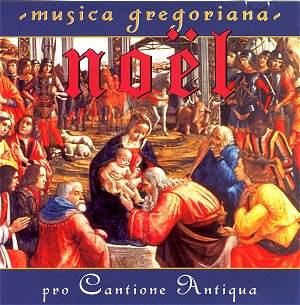This is a recital of Gregorian Chant on the theme
of Christmas, with chant for Advent and Christmas imaginatively
selected and arranged into a programme. Unfortunately whatever
planning and selection that went into producing the recital is
undermined by the lack of a programme booklet with an explanation
of the background behind the chants. All you have is a bald list
of names.
The recital opens with the Advent Vespers hymn
'Conditor Alme Siderum' followed by the antiphon 'Rorate Coeli
Desuper' from the 4th Sunday in Advent. Then the great
O antiphon 'O Sapientia' is performed along with its accompanying
Magnificat, followed by the Alma Redemptoris Mater and an Ave
Maria, the offertory for the 4th Sunday in Advent.
These are followed by the Christmas Vespers hymn 'Christe Redemptor
Omnium' and the Christmas Responsory 'Hodie Nobies Caelorum Rex'.
The centrepiece of the programme is a performance
of the 3rd Mass for Christmas Day, performing both
the Propers and the Ordinary (using the Missa de Angelis) and
concluding with the Ite Missa Est. The mass is preceded by a group
of Advent items with a strong Marian theme.
After the mass are a group of chants which reflect
the other feasts in the Octave of the Nativity. These include
'Hodie Christus Natus est', - the Magnificat Antiphon for the
Nativity, 'Video Caelos Apertus' - the Communion for the Feast
of St. Stephen, 'Salvetes Flores Martyrum' - the Vespers Hymn
for the Feast of Holy Innocents, the Antiphon 'Hostis Herodes',
'Reges Tharsis' - the Offertory of the Feast of the Epiphany,
'Tribulis Miraculis' - the Magnificat Antiphon for the Feast of
Epiphany. and ending with Presentation at the Temple.
Pro Cantione Antique are an all-male group, singing
the chant in unison. They make a fine, warm sound and are recorded
in a good acoustic. The chant, both words and music, remains clear
but the voices are surrounded by the warm aura of the church's
acoustic. They sing in an admirably clear and unified manner,
without the slightest hint of lack of unanimity of line. The role
of cantor is allocated to a number of different soloists depending
on the vocal range and they all acquit themselves admirably.
The chant is sung in a very sober, regular, metrical
manner and I must confess that, listened to in one sitting, this
starts to pall. I would have liked more flexibility of line, but
in its way their robust unison is entirely admirable. Though the
diction is excellent, I felt there was not always a good feeling
for the words. This group is made up of excellent musicians, but
their performance never really feels as if they have been doing
this all their life. That is the problem with recording plainchant.
No matter how excellent the musicians, you need to give the music
that something extra that only experience can bring.
Of course, there is a trade-off. On the Gloriae
Dei Cantores disc, the Gloriae Dei Cantores Schola are conducted
by Dr. Mary Berry in a programme of Christmas Chant which covers
very similar ground. Here they sing with admirable flexibility
and commitment - the group sing chant regularly at Mass and Vespers.
Where their repertoire overlaps with this disc, such as with the
antiphon 'Lumen ad Revelationem Gentium', they impress with the
vibrancy of their performance. You really do feel as if the group
has been singing chant forever, but the down-side is that sometimes
their line lacks unanimity and the solo voices are not perfect.
I am happy to make this trade-off. If perfection of the musical
line is important to you, then I can recommend this disc, but
you might need a Roman Gradual to work out what is being sung.
Robert Hugill
